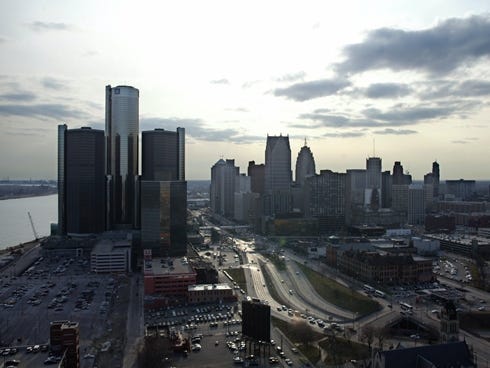DETROIT -- Chapter 9 bankruptcy is poorly understood, in part because it happens so infrequently. Detroit's case is the largest in U.S. history.
Here's what happens next:
â?¢ The city filed a Chapter 9 bankruptcy petition Thursday in the U.S. Eastern District Court of Michigan. The filing includes additional information on the city's financial outlook and could include details about the city's plan to cut costs, such as potential layoffs and department consolidation, said Ken Schneider, a bankruptcy attorney with Detroit-based Schneider Miller PC.
â?¢ Alice Batchelder, chief judge of the U.S. 6th Circuit Court of Appeals, will appoint a bankruptcy judge to oversee the city's case.
â?¢ The bankruptcy judge will determine where to hold hearings, which could take place in Detroit, Kentucky, Ohio or Tennessee.
â?¢ An automatic stay will be issued on most of Detroit's bills, including unsecured debts, Schneider said today. The city will continue to pay secured creditors, including water and sewer bondholders, who have the right to seize city assets if Detroit fails to pay.
â?¢ An automatic stay also will be issued on lawsuits against the city, including outside challenges by pension officials and union members. This means hearings in those lawsuits will be indefinitely delayed. The plaintiffs can recast their arguments inside of bankruptcy court, said Jay Welford, a bankruptcy attorney and partner at Southfield-based Jaffe Raitt Heuer & Weiss.
â?¢ The city doesn't need approval to continue services. For example, the police, fire, water, sewer and public works are completely unaffected by the bankruptcy filing for now and will operate as usual. However, cuts are possible in the future. "You have the ability to use your cash," Welford said. "You don't need court approval."
â?¢ Creditors can challenge the city's right to file for bankruptcy by issuing motions to dismiss the case.
â?¢ In this case, bondholders and pension officials could accuse the city of failing to negotiate "in good faith," one of the key criteria allowing the city to file for bankruptcy. The judge would hear arguments on this issue. A ruling could take days, weeks or months - perhaps even a year.
â?¢ The city also will have to prove it is insolvent, another stipulation required to file for Chapter 9 bankruptcy. According to the federal bankruptcy code, this requires the city to prove that it is not paying its bills. Emergency manager Kevyn Orr recently authorized the city to stop making payments on some debts. Bankruptcy experts believe that action was enough to satisfy the insolvency requirement, but creditors may still find wiggle room to argue the city is not insolvent.
â?¢ If the judge authorizes the city to move forward with a Chapter 9 bankruptcy case, Orr would propose a plan of reorganization. This could take weeks, months or years. Bankruptcy court allows the city to restructure its operations and its balance sheet. This could involve budget cuts, layoffs, consolidation, the sale of assets, slashing union contracts, selling assets and dramatically reducing city debts, including outstanding bonds.
â?¢ The city will attempt to win support for the reorganization plan from creditors, including secured bondholders, general obligation bondholders, unions and pension boards. If the city wins enough support, the plan would be put to a vote - and with enough support, the city could emerge from bankruptcy. Without enough support, the judge could tell the city it must continue to negotiate with creditors.
Orr may eventually pursue a "cram down" procedure, which would require winning support of a minority of creditors and convincing a judge that dissenting creditors are not being reasonable. "We'll probably get to that because I don't see how creditors are going to accept what he's talking about paying them," Schneider said.
â?¢ The length of the case is widely debated. Some experts believe it could be as short as several months. Others say it could take years. Most complex Chapter 9 cases have taken several years.


No comments:
Post a Comment